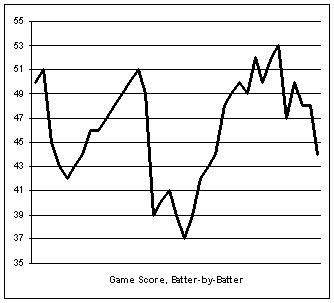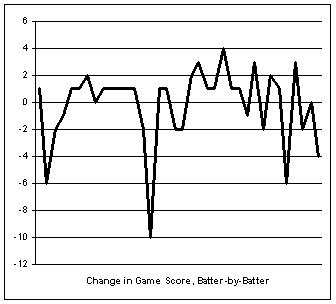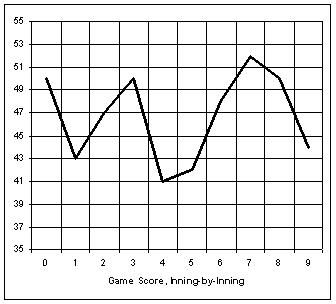Today's game Report is going to be a little different. I don't think anyone has ever done this before.
So I'm using a less sophisticated statistic: game score. It's nothing more than a fun way to compare pitching performances, but I'll give it a shot here.
If you aren't familiar with game scores, here is the definition from ESPN's MLB Stats Glossary:
Start with 50 points. Add 1 point for each out recorded, (3 points per inning). Add 2 points for each inning completed after the 4th. Add 1 point for each strikeout. Subtract 2 points for each hit allowed. Subtract 4 points for each earned run allowed. Subtract 2 points for each unearned run allowed. Subtract 1 point for each walk.
Randy Johnson had the best game score last year in the majors with a 100. Ted Lilly and David Bush were near the top of the American League with 92 and 91, respectively -- Lilly for his 12-K shutout of the Bosox and Bush for his Closing Weekend 11-K shutout of the Yankees' B Team. To open some old Season From Hell wounds, Pat Hentgen's last career start (2.2 IP, 8 R) was only 8.
Neither Roy Halladay nor Kip Wells lasted very long yesterday, so their game score Charts would be too short. I used all of Pittsburgh's starters instead, so we can see Gabe Gross' seventh homerun of the month in nice line graph form.
The first chart is simply the running game score after each plate appearance.

Notice that big drop from 49 to 39 about halfway through? That's \"Gabe Ruth\" right there. His two-run homerun dropped the Pirates' game score ten points (-2 for hit, -4 for each run scored). It was the biggest hit of the game, in terms of game score, as you can see by the next chart.

Once again, Gross' HR sticks out. Hudson's homer in the first is another significant event, as is Julius Matos' RBI single in the eighth, and Johnson's game winner.
The best at-bat according to GS as far as the Pirates are concerned was, ironically, Gabe Gross and his strikeout to end the sixth inning.
One last graph for you. It's a simple one.

The inning marked \"0\" indicates the game score before the game started, which will always be 50 as per the game score definition. Looking at this, the GS went up in the 2nd, 3rd, 5th, 6th and 7th innings and down in the 1st, 4th, 8th and 9th. Not surprisingly, the Jays scored runs in innings 1, 4, 8 and 9. So this doesn't tell us much.
There you go. Any thoughts on these game score charts? And, as always, feel free to link to a good baseball article or share some baseball news with us. I'm still waiting for Rickey Henderson to sign a minor league deal with someone.






